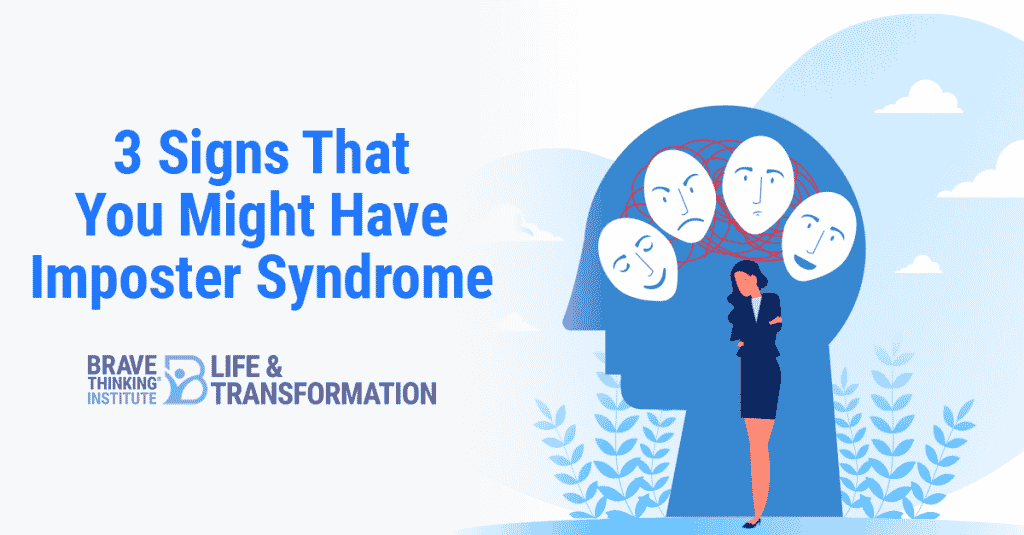
How to Erase Self Doubt and Embrace Your True Greatness
You may have never heard of the term “imposter syndrome” before, but chances are, you or someone you know has suffered from this debilitating psychological phenomenon.
According to a recent study published in the International Journal of Behavioral Science, about 70% of all people will experience symptoms of imposter syndrome at some point in their lives.
So how exactly can you know if you have imposter syndrome and is it possible to overcome?
The short answer is “yes,” you can triumph over imposter syndrome – but first, you must be able to recognize its symptoms.
What is imposter syndrome?
As mentioned before, imposter syndrome is classified as a psychological phenomenon or pattern. It’s marked by feelings of self-doubt, low self-confidence, anxiety, fear, negative self-talk and other destructive thoughts that, if not brought under control, can become inescapable and keep you from achieving the success you truly desire.
Many people who suffer from imposter syndrome describe it as feeling like a fraud. And it can affect people of varying levels of success – in fact, some of the most successful people I know have had imposter-like feelings at some point during their careers.
Imposter syndrome doesn’t only apply to your vocational or business success either. You could feel like a fraud as a mother, wife or friend. If you are constantly questioning your abilities or achievements in any area of your life, you could be suffering from imposter syndrome…
Or, you could just be experiencing temporary feelings of self-doubt. It’s important to understand the difference.
3 signs and symptoms of imposter syndrome
So how can you truly know whether or not you suffer from imposter syndrome? Here are three major warning signs to look out for:

1. You constantly compare yourself to others
It’s natural for humans to compare themselves with others. However, when comparison behavior becomes so pervasive that it leads to feelings of jealousy, envy and inadequacy, it’s a clear sign that you’re suffering from imposter syndrome.
If you fall into this category, you lack confidence in your own abilities and you’re constantly plagued with feelings of self-doubt. You tend to focus solely on those who you perceive to be more successful than you and believe that they have what it takes to succeed, but not you. You tell yourself things like:
- I’m not smart enough.
- I’m not skilled enough.
- I’m not educated enough.
- I’m too young.
- I’m too old.
The thing is, when you approach any goal or dream comparing yourself to others and believing they’re better than you, you actually block your ability to welcome new opportunities for growth into your life.
Living in a comparison mindset is restrictive, meaning it limits you and your success. But if you can turn that around into a confident, expansive mindset, a world of possibilities will present itself to you (more on that later).

2. You’re terribly afraid of failure
Many people who are afflicted with imposter syndrome tend to be very high achievers who fear failure more than just about anything else in the world. If this is you, you’ll try to avoid failing at all costs.
But the thing is, letting the fear of failure rule your thoughts and actions comes at a HUGE cost, because ultimately what usually happens as a result is… nothing.
Nothing happens.
You set the bar so high for yourself that you become paralyzed with fear. So rather than risk failure, you just give up and walk away.
The truth is, failure is not only normal, it’s healthy. Trying and failing is actually one of the most fundamental learning experiences there is, and if you can’t learn, you can’t grow.
Think of it this way. When a baby is learning how to walk for the very first time, they’re constantly failing. They’ll take a step, and stumble. Take another step, and fall. Take two more steps, and fall again until finally, after numerous failures, sometimes lasting months, that baby finally learns how to walk without stumbling.

How? That baby never gave up. She never let the fear of failing at something she had NEVER done before stand in the way of her goals. Because every failure is simply feedback.
Each time we stumble, we learn.
Every time we fall, we receive feedback on how we can do things differently next time.
The Power of Self-Confidence
Guided Meditation: Living from the Authentic, Confident You
3. You feel the need to do everything on your own and rarely ask for help
If you read this and thought, “yes, that’s definitely me,” guess what? You not only suffer from imposter syndrome, you also have lone ranger syndrome. Don’t worry, though… Stay with me!
Lone ranger syndrome is just a form of imposter syndrome, and it’s very common. As the name suggests, those who suffer from lone ranger syndrome feel that if they can’t handle all of their tasks, jobs and responsibilities on their own, they must be a fraud. If this is you, you believe that your competence is based squarely on your ability to accomplish whatever goal or dream you’ve set for yourself all by yourself.

However, what you probably don’t know is that every successful person I’ve studied or worked with believes that the opposite is true, and I do too. Here’s the truth… unless you’re some rare phenom or super genius, you simply can’t do it all on your own without having to sacrifice something that’s important to you.
Successful people accept this fact and seek help from others so that they can truly focus on what they do best and what gives them a sense of purpose. But learning to accept this truth takes confidence.

How do you start building more confidence?
As you now know, repairing and rebuilding your confidence is the first step to overcoming imposter syndrome, but how do you do that?
Using positive, daily affirmations is proven to help build confidence, and one of the most effective ways to do this is through meditation.
Many of the world’s most successful people use meditation to quiet their minds, tap into their intuition and more easily follow its guidance toward a freer, fuller and more expansive life.
If you’d like a powerful guided meditation that will help you get rid of your inner critic so you can eliminate imposter syndrome from your life, click here for my free “The DNA of Authentic Confidence” meditation!





Thanks alot Mary for the informations. I really appreciate
Very nice information, just tell the knowledge for very strong mindset
Very nice, valuable information, just would feel more good for very strong mindset
I find it extremely difficult to quiet my inner critic. I have a failed marriage, and one of my two adult children is an addict who lives in my garage.
Do not feel like a failure for those things. I have failed marriage and I’m going through a divorce now plus I have an adult child who s an addict living with me. I Just try to be honest and figure out my part in those situations and work on that in me. A lot of times things just happen and it’s not all our fault. We are all products of our upbringing, and tough situations are opportunities to learn I don’t want to learn. I want to already know LOL If the addict is actively using please don’t let them in your home. They will steal from you and that hurts. Try to focus on all the things that you’re doing right Good luck.
You can work on you and what you’re attracting. Into your life. The rest is only perceived control. You cannot control how anyone “turns out.” Whether it is perceived as “good” or “bad,” THEY are in control of their own experience. You can love them and release the need to control or “fix.” It will help you gain clarity and peace when you release the expectations for any specific outcome. Sending you love.
Wow yes okay thank you so much I want to really success in my life Godbless you All thank you All
Thanks you
This is the reason I adore this site u really touches my heart with your thoughts and make me to get interested actually ,this motion really touches me Sometimes I do behave and understand like
I’m not smart enough.
I’m not skilled enough.
I’m not educated enough.
I’m too young.
I’m too old. Thanks
This is wonderful, am encouraged.